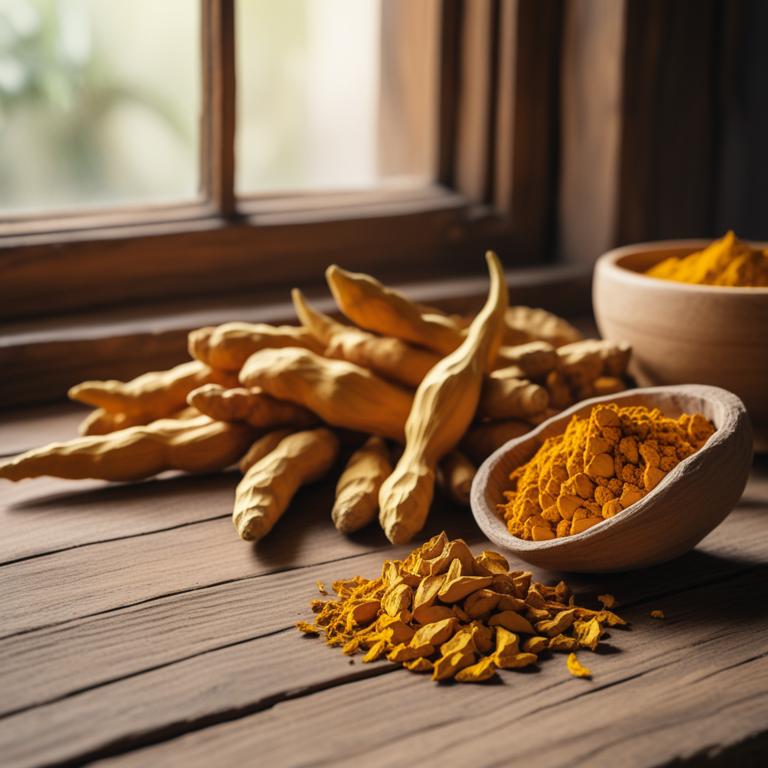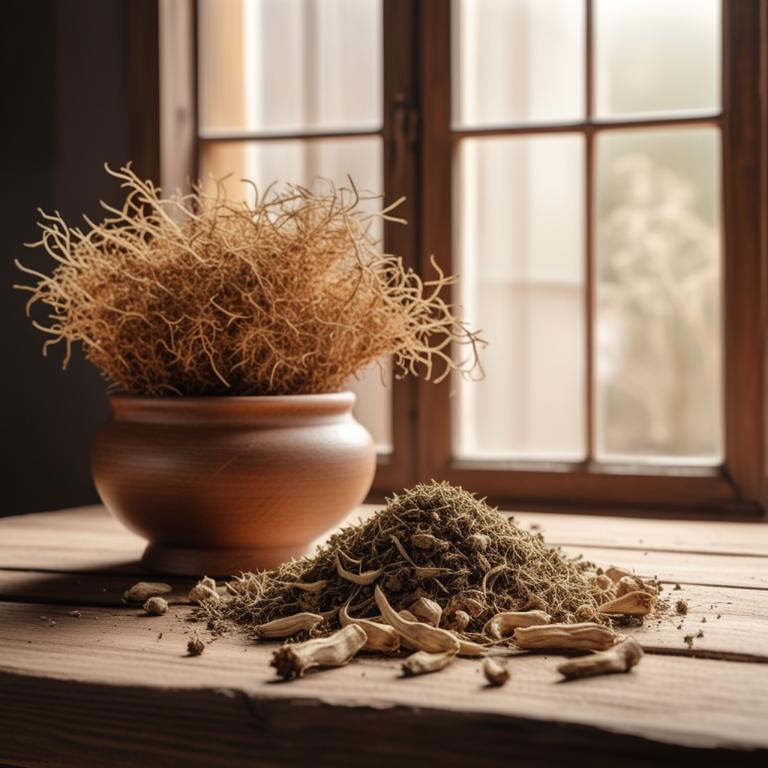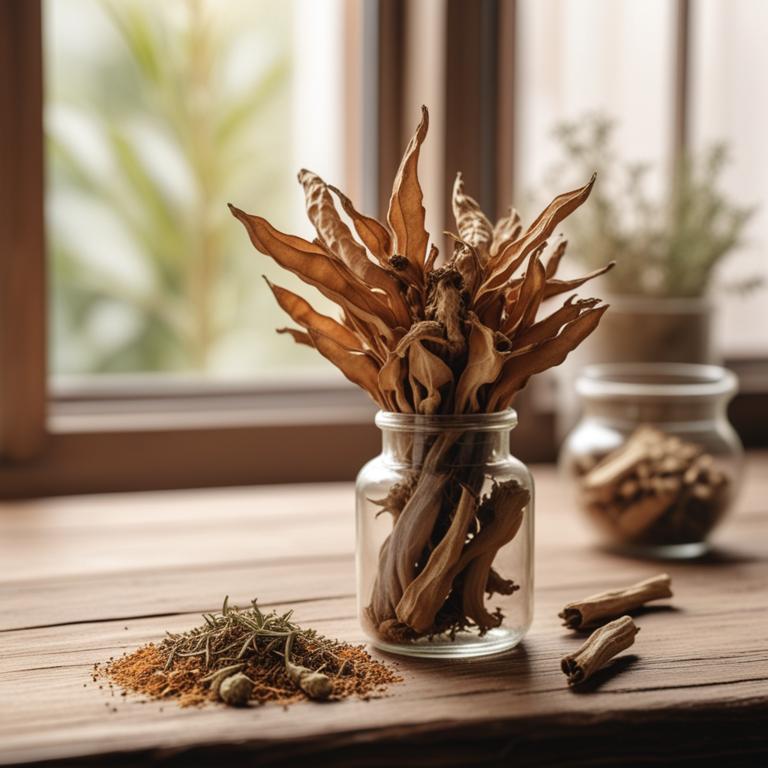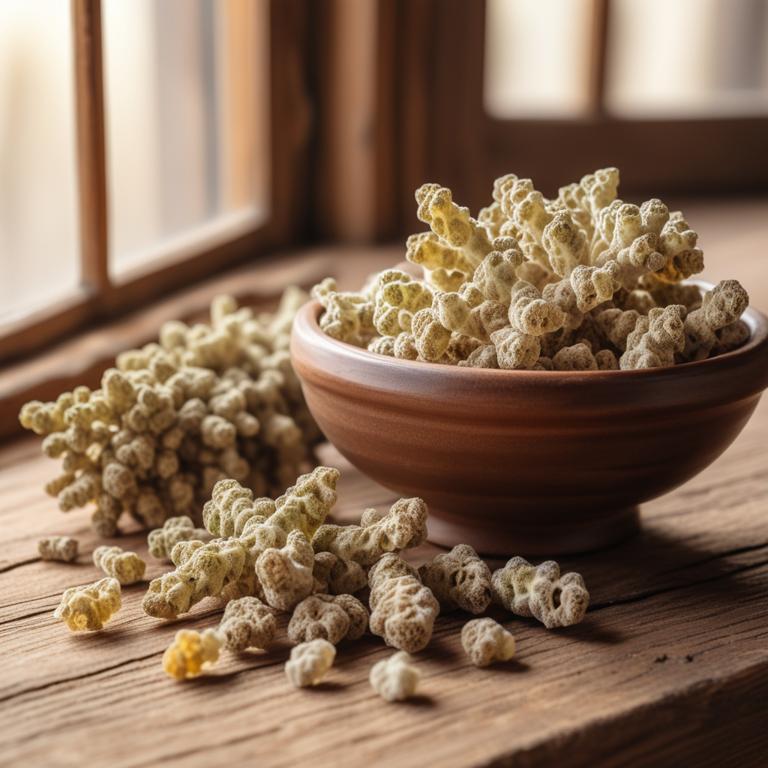Updated: Dec 1, 2024
Natural Remedies for Leg Pain: Causes and Herbal Preparations

Leg pain is a common issue that can make everyday activities difficult and uncomfortable.
It can range from a dull ache to a sharp stabbing sensation, and it can be caused by various factors such as overuse, injury, or underlying medical conditions like arthritis or poor circulation. When you're experiencing leg pain, it can be hard to walk, stand, or even sleep. Herbal remedies can help alleviate leg pain by addressing the underlying causes. Certain herbs, like ginger and turmeric, have anti-inflammatory properties that can reduce swelling and ease pain.
Willow bark, which contains salicin, a natural pain reliever, can also provide relief. To use these herbs for leg pain, you can try drinking teas made from them, or taking supplements in capsule or tincture form. You can also apply topical creams or ointments that contain the herbs. For example, a warm ginger tea can be soothing and comforting, while a cream or ointment containing willow bark can be applied directly to the affected area. Some people find that using a combination of herbal remedies can be more effective than using a single herb.
Others prefer to incorporate herbs into their daily routine as a preventative measure, rather than waiting until they experience pain.
Table of Contents
What leads to the development of leg pain?
The main causes of leg pain are varied and can be quite uncomfortable.
One common cause is Varicose Veins, which are swollen and twisted veins that can cause pain and discomfort in the legs. This is often due to weak valves in the veins that allow blood to flow back and pool in the legs, putting pressure on the veins and causing pain. Another cause of leg pain is Arthritis, a condition that affects the joints and can cause pain, stiffness, and swelling in the legs. This is usually due to wear and tear on the joints, often as a result of aging or repeated strain on the joints. Shin Splints are a common cause of leg pain in athletes and individuals who are new to exercise.
This is due to inflammation and irritation of the tendons and muscles in the lower leg, often as a result of repetitive stress and overuse. Gout is another cause of leg pain, which is a type of arthritis that causes sudden and severe pain in the joints. This is usually due to the buildup of uric acid in the body, which can form crystals that deposit in the joints and cause pain. Sciatica is a type of leg pain that is caused by compression or irritation of the sciatic nerve, which runs from the lower back down to the legs. This can be due to a herniated disk, spinal stenosis, or other conditions that put pressure on the nerve and cause pain. Diabetes can also cause leg pain, as high blood sugar levels can damage the nerves and blood vessels in the legs, leading to numbness, tingling, and pain.
This is often due to the body's inability to regulate blood sugar levels, leading to nerve damage and other complications.
What advantages come from using herbs for leg pain?
Using herbs for leg pain can bring relief and ease discomfort.
They can help reduce inflammation and swelling in the affected area, which in turn can decrease pain. Herbs can also improve blood flow, which is essential for healing and repairing damaged tissues.
This can lead to faster recovery and reduced muscle soreness. Some herbs have anti-oxidant properties, which can protect the body from further damage and promote overall well-being. Additionally, herbs can be used in a variety of forms, such as teas, tinctures, or topical creams, making them a versatile and convenient option for managing leg pain.
By incorporating herbs into your treatment plan, you may be able to reduce your reliance on pain medications and improve your quality of life.
What are the best medicinal herbs for reducing leg pain?

If you're experiencing leg pain, herbs can be a great natural way to find some relief.
Let's take a look at some of the most effective ones. Curcuma longa, or turmeric, is a great anti-inflammatory, which means it can help reduce swelling in your legs. It contains a compound called curcumin that blocks the production of enzymes that cause pain and inflammation. Another herb that's often used for leg pain is Zingiber officinale, or ginger. It has anti-inflammatory properties similar to turmeric and can help ease muscle and joint pain. It's also great at reducing nausea and improving digestion, which can be helpful if you're experiencing pain in your legs due to digestive issues.
Capsicum annuum, or cayenne pepper, contains a compound called capsaicin that can help block the production of a chemical called substance P, which transmits pain signals to your brain. When you apply cayenne pepper topically to your legs, it can help reduce the pain you're feeling. Piper nigrum, or black pepper, is another herb that's often used for its anti-inflammatory properties. It contains a compound called piperine that can help reduce swelling and pain in your legs. Lastly, Glycyrrhiza glabra, or licorice root, is often used to treat joint pain and inflammation. It's a natural anti-inflammatory that can help reduce swelling and pain in your legs.
It's also great at soothing sore muscles and joints.
What herbal preparations are most frequently used to cure leg pain?

Herbal preparations can be a great way to manage leg pain, and they come in different forms to suit your needs.
If you prefer to swallow a pill, herbal capsules are a convenient option. They contain dried and powdered herbs that are mixed with other ingredients to make a capsule. This form is good for people who don't like the taste of herbs or have trouble swallowing tablets. Another option is a tincture, which is a liquid extract of herbs. You can take tinctures by mouth, usually mixed with water or juice. Tinctures are great for people who want fast relief from pain and inflammation. They can be absorbed quickly into the bloodstream, so they work fast.
For people who prefer to apply a topical treatment, herbal creams and salves can be very effective. These preparations contain herbs that are infused in a carrier oil or wax, which helps to soothe and calm the skin. You can apply them directly to the affected area to reduce pain and inflammation. Herbal decoctions are another form of preparation that can be used to make a tea or a warm compress. You can drink decoctions to help your body absorb the healing properties of the herbs. Alternatively, you can use them to make a warm compress to apply directly to the affected area. Lastly, herbal salves are similar to creams but are thicker in texture and better suited for applying to dry or cracked skin.
They can be used to protect and soothe the skin, while also reducing pain and inflammation.
Additional Resources:
What herbs are contraindicated in cases of leg pain?
If you have leg pain, it's best to avoid certain herbs that might make it worse.
Hydrastis canadensis, also known as goldenseal, can cause problems with urination, and if you're already experiencing pain in your legs, you don't want to exacerbate it. Aristolochia clematitis, or birthwort, has been linked to kidney damage, which can be especially concerning if you're experiencing pain in your legs or back.
Ginkgo biloba may seem like a harmless herb, but it can cause bleeding problems, and if you're already experiencing pain in your legs, the risk of bleeding is increased. Cinchona officinalis, or Peruvian bark, contains compounds that can slow down blood clotting, which is not ideal if you have leg pain.
Vitex agnus-castus, or chasteberry, is not typically associated with leg pain, but it can cause issues with blood sugar levels and blood pressure, which can indirectly contribute to leg pain.
FAQ
Are there any specific herbs that can prevent leg pain?
Ginger has anti-inflammatory properties that may help reduce leg pain.
Turmeric contains a compound called curcumin, which can also ease inflammation. Both herbs can be consumed as teas or added to food for potential pain relief.
Some people find that taking these herbs regularly helps to alleviate their leg pain.
Is it safe to use herbal remedies for leg pain during pregnancy?
If you're experiencing leg pain during pregnancy, some herbal remedies might help.
However, it's essential to know their effects on your body and your baby. Certain herbs like ginger and turmeric have anti-inflammatory properties that might ease pain.
But, it's crucial to use them in moderation and follow proper preparation instructions to avoid any potential harm.
Are there any herbs that can reduce the frequency of leg pain?
Ginger is sometimes used for its potential to reduce inflammation and ease muscle pain, including leg pain.
Turmeric also contains a compound called curcumin, which may help alleviate pain and discomfort.
These herbs are sometimes used as natural remedies, but their effectiveness can vary from person to person.
Related Articles

Frozen Shoulder: Causes, Symptoms, and Natural Remedies with Medicinal Herbs

Relieving Muscle Pain: Understanding Its Causes and Herbal Remedies

Understanding Lower Back Pain: Causes, Medicinal Herbs, and Herbal Preparations

The Causes of Gout: Exploring Herbal and Medicinal Treatments

The Osteoarthritis Guide: Causes, Medicinal Herbs, and Herbal Preparations for a Healthier You






